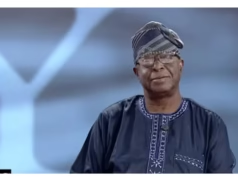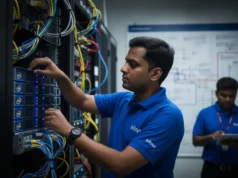The Federal Government has restated its strong commitment to the digital transformation of public schools across Nigeria, promising to bridge the technology gap in education and make classrooms more interactive, inclusive, and globally competitive.
Speaking during the launch of the Digitalisation of Public Schools Initiative and the distribution of interactive smart boards in Lagos, the Minister of State for Education, Dr. Maruf Tunji Alausa, described the project as a critical step in realising President Bola Tinubu’s Renewed Hope Agenda for education.
According to Alausa, the government’s goal is to ensure every Nigerian child — regardless of background — can learn with modern digital tools that encourage creativity, critical thinking, and problem-solving. “This initiative goes beyond technology; it’s about giving every learner a fair chance to thrive in a digital world,” he said.
The Minister noted that the transformation will not stop at installing devices but will involve overhauling how schools teach, how students learn, and how teachers are trained. “We are embedding digital literacy, artificial intelligence, robotics, and coding into our curriculum. Nigeria’s public schools must prepare learners for the realities of today’s knowledge-driven economy,” he added.
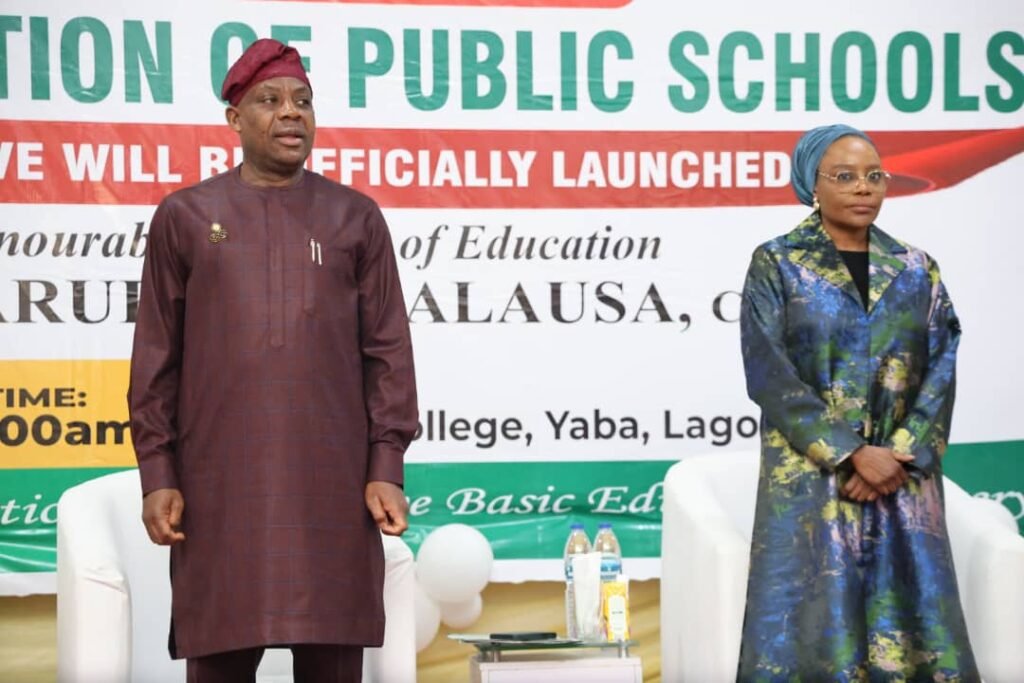
Table of Contents
From Chalkboards to Smart Boards
The introduction of interactive smart boards marks a symbolic shift from traditional chalkboards to modern, engaging, and tech-driven classrooms. The devices will allow teachers to use videos, animations, and live demonstrations while enabling students to participate actively in lessons.
The Federal Government, through the Universal Basic Education Commission (UBEC), has already distributed hundreds of these smart boards to schools across the country. UBEC’s Executive Secretary, Dr. Hamid Bobboyi, revealed that more than 800 interactive boards have reached schools in the pilot phase, with teacher training programmes already underway.
“This is a long-term investment in the future of Nigerian children,” Bobboyi said. “Digital transformation is not optional anymore — it is the foundation of modern learning.”
To complement the smart boards, UBEC has also supplied more than 60,000 tablets to teachers nationwide. The Commission has partnered with the National Information Technology Development Agency (NITDA) to train educators in digital literacy and has begun building digital learning centres across all six geopolitical zones.
These steps, according to UBEC, are part of a broader digital education plan that includes:
- A Nigeria Education Data Initiative (NEDI) to harmonise education data and improve policy planning.
- A Nigeria Education Repository and Databank (NERD) to authenticate certificates using QR codes and national credential numbers.
- An ongoing ICT Infrastructure Development Project supported by the Agence Française de Développement (AFD), targeting improved connectivity and e-learning capacity in tertiary institutions.
In Lagos, where the launch took place, the initiative aligns with the state’s Eko Digital and STEAM Learning programmes, which have already introduced robotics and technology-based teaching in select schools.
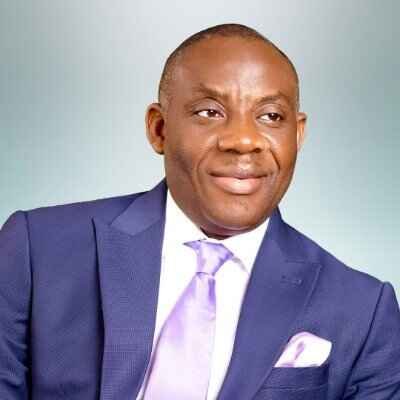
Bridging the Digital Divide in Education
Despite the optimism, education experts acknowledge that the road to full digitalisation will not be easy. Many public schools, especially in rural areas, still struggle with basic infrastructure such as electricity, internet access, and classroom facilities. Without these, deploying digital tools effectively becomes a challenge.
Minister Alausa admitted that addressing these gaps requires collaboration between the federal and state governments, private partners, and local communities. “We must ensure that no child is left behind simply because of where they live. The digital divide must not become an education divide,” he said.
Teacher readiness is another key concern. The transition from chalk-and-talk methods to interactive digital learning demands not only new skills but also a change in teaching culture. UBEC said it is investing in ongoing professional development to help teachers integrate technology meaningfully into their lessons.
Dr. Alausa assured stakeholders that the Federal Government is aware of these challenges and is developing a phased strategy to ensure sustainability. “This is not a one-off intervention,” he explained. “It’s a continuous process that includes teacher training, maintenance, monitoring, and curriculum review.”
To ensure inclusivity, UBEC is also introducing assistive digital technologies for learners with disabilities, such as talking computers for the visually impaired and interactive applications for students with hearing challenges.
Meanwhile, state governments are expected to key into the national policy by setting up their own digital learning centres and connecting schools to the national digital education grid.
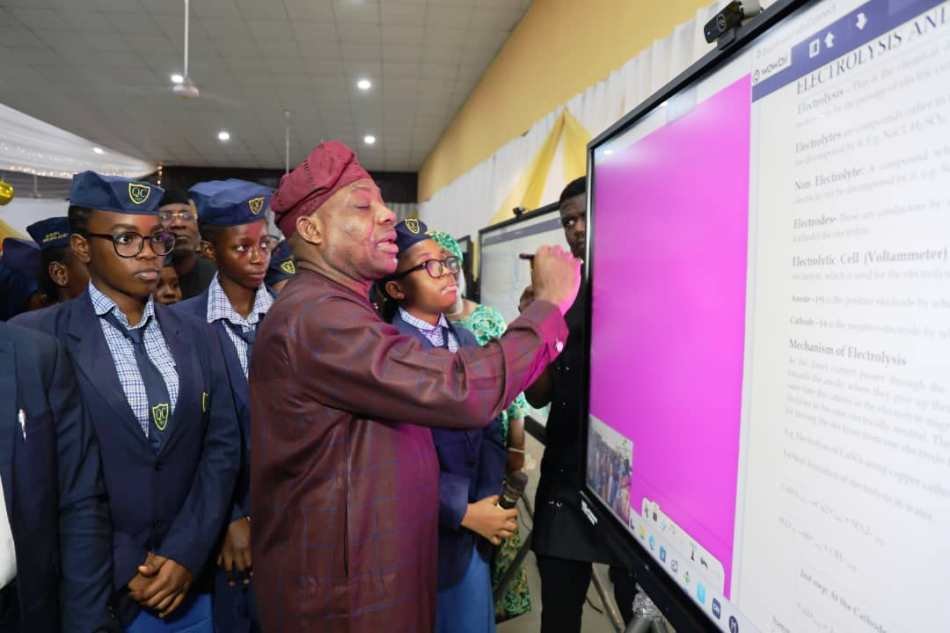
Building the Future of Nigerian Learning
For many education stakeholders, the FG’s reaffirmation signals more than a policy announcement — it’s a call to reimagine what learning in Nigeria should look like. By moving towards digital classrooms, students can experience the same quality of interactive education enjoyed by their peers in more developed countries.
The Principal of Queen’s College, Lagos, Dr. (Mrs.) Ronke Obabori, expressed gratitude to the Federal Government for choosing the school to host the launch. She urged both teachers and students to embrace the new tools with open minds, saying, “Technology will not replace teachers, but teachers who use technology will replace those who don’t.”
Education advocates also believe the project will help improve learning outcomes, especially in science, technology, engineering, and mathematics (STEM) subjects. By integrating AI and robotics into the school curriculum, learners can better connect classroom theory with practical application.
Beyond classrooms, the FG’s plan to establish digital databases for education will also help reduce certificate forgery, promote transparency, and make it easier for employers and institutions to verify academic credentials.
The Minister concluded the event with a charge to all stakeholders — teachers, parents, development partners, and communities — to support the vision. “We must work together to give our children an education that prepares them not for yesterday, but for tomorrow,” he said.
As Nigeria navigates a rapidly changing global economy, digital transformation of public schools stands as one of the most crucial reforms for the country’s future. If implemented with discipline and collaboration, this policy could reshape learning, bridge inequalities, and empower a new generation of Nigerian innovators.
Join Our Social Media Channels:
WhatsApp: NaijaEyes
Facebook: NaijaEyes
Twitter: NaijaEyes
Instagram: NaijaEyes
TikTok: NaijaEyes
READ THE LATEST EDUCATION NEWS




